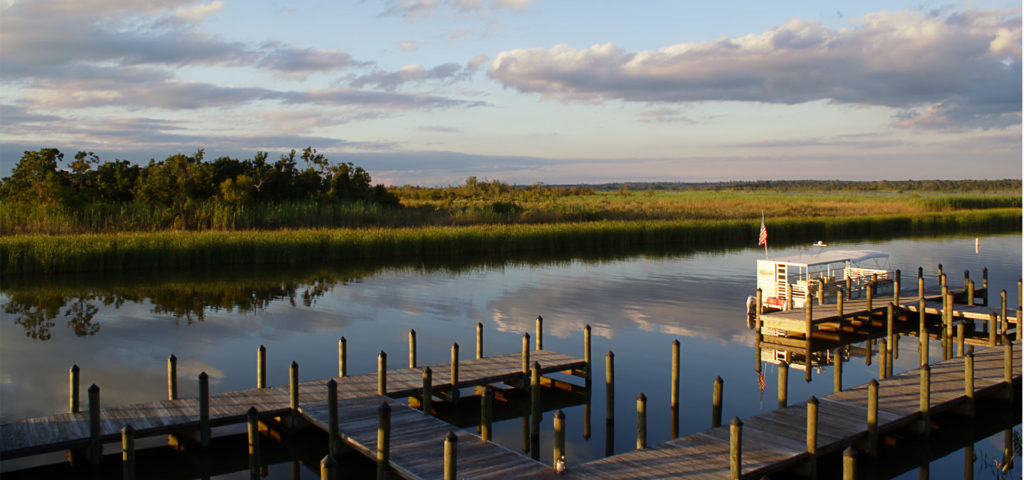Adapting to a Changing Gulf Region: Join the Online Course

By: Lily Swanbrow Becker
These days, we are all trying our best to “stay connected.” As we collectively wade through the murky waters of isolation, many of us are turning to our screens in search of connection touch points and meaningful ways to engage.
While there is certainly no shortage of virtual opportunities to connect both personally and as fellow adaptation professionals, there is one I am particularly excited for this summer: a new online course, Adapting to a Changing Gulf Region (ACGR). This course is tailored to natural resource managers with interests in the United States Gulf Coast Region, who want to grow their knowledge of foundational climate change adaptation concepts illustrated through regional case studies. The course will run from June through October 2020, is free of charge, and is a collaboration between Florida Fish and Wildlife Conservation Commission (FWC), the Gulf of Mexico Alliance (GOMA), and ASAP. Hosted by FWC, ACGR features natural resource focused content aligned to the foundational concepts and core competencies of ASAP’s draft Knowledge and Competencies Framework for Climate Change Adaptation and Resilience Professionals (K&C Framework).
For me, the Gulf Coast – vibrant, soulful, expansive, can’t really be contained digitally. Raised in the north, I fled south as soon as I could and by way of Port Aransas, Texas to Key West, Florida and all the places in between, I’ve spent my adult life living in, working along, and being charmed by the U.S Gulf Coast. Sadly, a disastrous mix of hurricanes, rising seas and sinking land, and human exploitation now amplified by a changing climate, puts the region on the front lines of climate change. When the COVID-19 pandemic necessitated shifting a planned traveling, in-person component of this course to a fully virtual model, I was at first disappointed to lose that tangible connection to swamp, sand, and surf. Yet in building the content for course and weaving together the concepts, people, and places of the region, it became clear to me that virtual or not, points of connection in this course abound.
First, the people. Any endeavor in learning is only as good as the people involved and with capacity for 100 participants from across the region, ACGR will convene a rich group of conservation practitioners to learn from each other as they learn from course speakers and resources. Course registrations are ongoing and will be accepted through June 1st. On the project team, we are working hard to ensure a diverse mix of participants spanning the geographies, areas of expertise, stages of career, and perspectives that represent this manifold region. To make ACGR as interactive as possible, we are customizing a robust virtual platform to allow participants to engage with ease throughout the course. We hope that participants in this course not only learn from each other but begin to get to know each other as well. The collaborative final project, a compendium of participant professional work that integrates concepts covered in ACGR, is intended as a resource to spark ongoing connection, and perhaps even offer kindling toward a regional network of natural resource-focused adaptation professionals that would build capacity and provide support far beyond the 18 weeks of formal course instruction.
In ACGR, the content is built around and anchored in connection as well. As any adaptation professional can attest, connecting broad, foundational concepts to crisp and clear examples or case studies can be a challenge. We seek to do this in ACGR with the invaluable help and guidance of ASAP’s K&C Framework. To develop course content, we’ve anchored each of nine session topics to a Foundational Knowledge Concept and aligned supporting resources to Core Competencies and Glossary Terms identified in the K&C Framework. In many cases, this integration was seamless, such as linking a planned session on “Communicating Adaptation Solutions” to the “Communication” Foundational Knowledge Concept, and it was affirming to see the clear link between a broad framework for all adaptation professionals and a regionally-focused curriculum cultivated for natural resource managers. At other times, we had to work a bit harder to integrate Foundational Knowledge Concepts like “Mitigation,” or associated Core Competencies like “Building Psychological Strength to Proactively Confront Change” that are not obvious fits within a typical adaptation for natural resources curriculum. But stretching our assumptions to link apparently disparate concepts and reaching for the opaquer connections is what I hope will make this course stand out and deliver value to those who engage. Weaving a complex web of connections – connecting ideas, methods, science, people, and places, is inherent in so much of what we do as adaptation professionals. In weaving these connections to build a new course, it’s been a boon to apply the K&C Framework as a guidepost.
Finally, I would be remiss not mention the personal connection this course represents for me. As a former full-time employee of both ASAP and FWC, two organizations for which I have incredible respect, it is an honor and great fun to be coordinating this collaborative endeavor. Please reach out directly with any questions and remember that registration closes on June 1.
